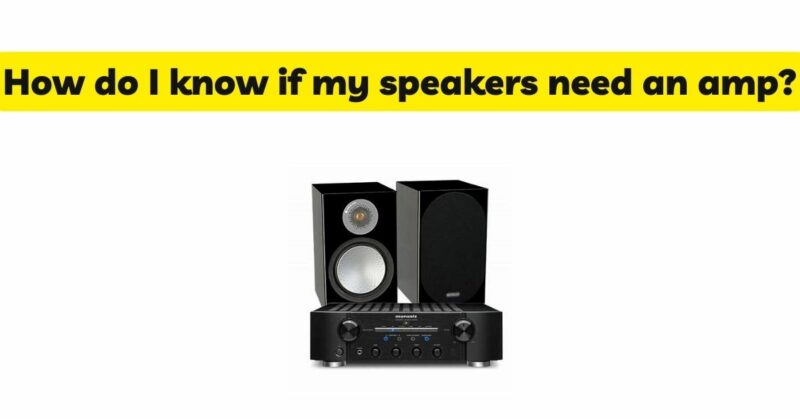Choosing the right audio setup for your speakers is crucial to achieving optimal sound quality and performance. One common question that arises is whether speakers require an amplifier to function properly. In this article, we will explore various factors that can help you determine if your speakers need an amplifier. By understanding these factors, you can make an informed decision and ensure that your speakers are properly powered for an immersive audio experience.
I. Speaker Types and Power Requirements:
- Active (Powered) Speakers: Active speakers have built-in amplifiers, which means they don’t require an external amplifier to produce sound. They are designed to be connected directly to an audio source, such as a computer, smartphone, or mixer. Active speakers are a popular choice for multimedia setups, desktop speakers, or smaller audio systems where simplicity and convenience are desired.
- Passive Speakers: Passive speakers do not have built-in amplifiers and require an external amplifier to power them. They are connected to the amplifier through speaker wire or cables. Passive speakers are commonly found in home theater setups, studio monitors, and larger audio systems where higher power output and flexibility are desired.
II. Power Handling and Sensitivity:
- Power Handling: Consider the power handling capabilities of your speakers. Power handling refers to the maximum amount of power (measured in watts) that speakers can handle without distortion or damage. Check the specifications provided by the manufacturer to determine the recommended power range for your speakers. If your speakers have high power handling capabilities, they may benefit from being paired with a dedicated amplifier to fully utilize their potential.
- Sensitivity: Speaker sensitivity is a measure of how effectively a speaker converts power into sound. It is typically measured in decibels (dB) and represents the sound output for a given amount of input power. Speakers with higher sensitivity ratings require less amplifier power to achieve a certain volume level compared to speakers with lower sensitivity ratings. If your speakers have low sensitivity, they may benefit from an amplifier with higher power output to ensure sufficient volume and clarity.
III. Desired Volume Levels and Room Size:
- Volume Levels: Consider the volume levels at which you typically listen to music or enjoy other audio content. If you prefer higher volume levels or have a large room where sound needs to be dispersed evenly, an amplifier can provide the necessary power to achieve the desired volume without distortion.
- Room Size: The size of your room also plays a role in determining whether your speakers need an amplifier. Larger rooms require more power to fill the space with sound effectively. If you have large, open areas or multiple listening zones, an amplifier can provide the necessary power to ensure consistent sound coverage.
IV. Audio Source and Signal Strength:
- Audio Source Output: Evaluate the output strength of your audio source. If your source device, such as a smartphone, computer, or TV, has a weak audio output, connecting your speakers directly to it may result in lower volume levels and compromised sound quality. In such cases, an amplifier can boost the signal and deliver cleaner and more powerful audio to your speakers.
- Signal Integrity: An amplifier can also improve signal integrity by minimizing interference or distortion that may occur when the audio signal travels through long cables or encounters other electrical components. If you have a complex audio setup or are experiencing signal degradation, an amplifier can help maintain the integrity of the audio signal.
V. Bass Response and Audio Fidelity:
- Bass Enhancement: If you desire enhanced bass response, an amplifier can provide the necessary power to drive subwoofers or larger speakers designed for deep low-frequency reproduction. Amplifiers with dedicated subwoofer outputs can optimize the performance of your bass speakers, adding depth and impact to your audio.
- Audio Fidelity: An amplifier can improve audio fidelity by delivering cleaner, more detailed sound reproduction. With a dedicated amplifier, you may experience enhanced dynamics, better imaging, and improved overall sound quality.
Conclusion:
Determining if your speakers require an amplifier depends on various factors such as speaker type, power handling, sensitivity, desired volume levels, room size, audio source output, signal strength, bass requirements, and desired audio fidelity. Active speakers have built-in amplifiers, making them self-powered and eliminating the need for an external amplifier. Passive speakers, on the other hand, require an external amplifier for proper power distribution. Assess your specific requirements, preferences, and system components to make an informed decision. Whether you choose to use an amplifier or not, prioritize matching the power requirements of your speakers with the amplifier’s capabilities to ensure optimal sound performance and an enjoyable audio experience.


